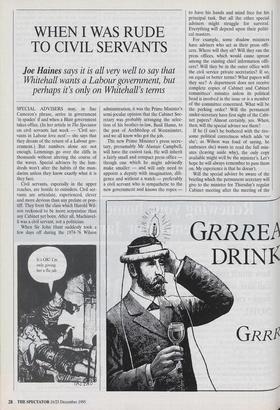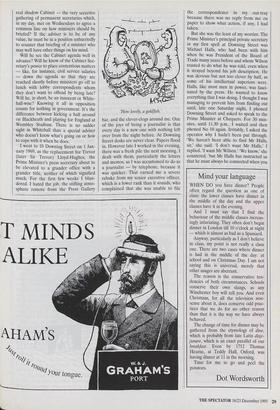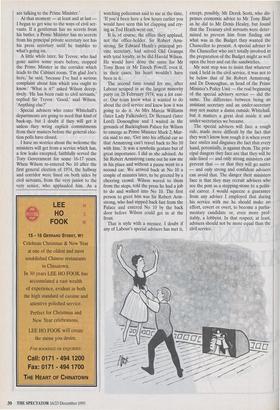WHEN I WAS RUDE TO CIVIL SERVANTS
Joe Haines says it is all very well to say that
Whitehall wants a Labour government, but perhaps it's only on Whitehall's terms
SPECIAL ADVISERS may, in Sue Cameron's phrase, arrive in government `in spades' if and when a Blair government takes office. (In her article in The Spectator on civil servants last week — 'Civil ser- vants in Labour love nest'— she says that they dream of the return of a Labour gov- ernment.) But numbers alone are not enough. Lemmings go over the cliffs in thousands without altering the course of the waves. Special advisers by the hun- dreds won't alter the habits of the man- darins unless they know exactly what it is they face.
Civil servants, especially in the upper reaches, are hostile to outsiders. Civil ser- vants are articulate, experienced, clever and more devious than any prelate or pon- tiff. They form the class which Harold Wil- son reckoned to be more serpentine than any Cabinet yet born. After all, Machiavel- li was a civil servant, not a politician.
When Sir John Hunt suddenly took a few days off during the 1974-76 Wilson administration, it was the Prime Minister's semi-jocular opinion that the Cabinet Sec- retary was probably arranging the selec- tion of his brother-in-law, Basil Hume, to the post of Archbishop of Westminster, and we all know who got the job.
The new Prime Minister's press secre- tary, presumably Mr Alastair Campbell, will have the easiest task. He will inherit a fairly small and compact press office though one which he might advisedly make smaller — and will only need to appoint a deputy with imagination, dili- gence and without a watch — preferably a civil servant who is sympathetic to the new government and knows the ropes — to have his hands and mind free for his principal task. But all the other special advisers might struggle for survival. Everything will depend upon their politi- cal masters.
For example, some shadow ministers have advisers who act as their press offi- cers. Where will they sit? Will they run the press offices, which would cause uproar among the existing chief information offi- cers? Will they be in the outer office with the civil service private secretaries? If so, on equal or better terms? What papers will they see? A department does not receive complete copies of Cabinet and Cabinet committees' minutes unless its political head is involved in the issue or is a member of the committee concerned. What will be the pecking order? Will the permanent under-secretary have first sight of the Cabi- net papers? Almost certainly, yes. When, then, will the special adviser see them?
If he (I can't be bothered with the tire- some political correctness which adds 'or she'; as Wilson was fond of saying, he embraces she) wants to read the full min- utes (leaving aside why), the only copy available might well be the minister's. Let's hope he will always remember to pass them on. My experience is that he doesn't.
Will the special adviser be aware of the briefing which the permanent secretary will give to the minister for Thursday's regular Cabinet meeting after the meeting of the real shadow Cabinet — the very secretive gathering of permanent secretaries which, in my day, met on Wednesdays to agree a common line on how ministers should be briefed? If the adviser is to be of any value, he must be in a position unhurriedly to counter that briefing of a minister who may well have other things on his mind.
Will he see the Cabinet agenda well in advance? Will he know of the Cabinet Sec- retary's power to place contentious matters — like, for instance, civil service salaries — down the agenda so that they are reached shortly before ministers go off to lunch with lobby correspondents whom they don't want to offend by being late? Will he, in short, be an innocent or White- hall-wise? Knowing it all in opposition counts for nothing in government. It's the difference between kicking a ball around on Blackheath and playing for England at Wembley Stadium. There is no sadder sight in Whitehall than a special adviser who doesn't know what's going on or how to cope with it when he does.
I went to 10 Downing Street on 1 Jan- uary 1969, as the replacement for Trevor (later Sir Trevor) Lloyd-Hughes, the Prime Minister's press secretary about to be elevated to a grander office with a grander title, neither of which signified much. For the first few weeks I blun- dered. I hated the job, the stifling atmo- sphere remote from the Press Gallery How lovely, a goldfish.'
bar, and the clever-clogs around me. One of the joys of being a journalist is that every day is a new one with nothing left over from the night before. At Downing Street desks are never clear. Papers flood in. However late I worked in the evening, there was a fresh pile the next morning. I dealt with them, particularly the letters and memos, as I was accustomed to do as a journalist — by telephone, because it was quicker. That earned me a severe rebuke from my senior executive officer, which is a lower rank than it sounds, who complained that she was unable to file the correspondence in my out-tray because there was no reply from me on paper to show what action, if any, I had taken.
But she was the least of my worries. The Prime Minister's principal private secretary in my first spell at Downing Street was Michael Halls, who had been with him when he was President of the Board of Trade many years before and whom Wilson trusted to do what he was told, even when it strayed beyond his job description. He was devious but not too clever by half, as some of his intellectual superiors were. Halls, like most men in power, was fasci- nated by the press. He wanted to know everything that I was doing. I thought I was managing to prevent him from finding out until, late one Saturday night, I phoned Downing Street and asked to speak to the Prime Minister at Chequers. For 30 min- utes, until 11.30 p.m., I waited and then phoned No 10 again. Irritably, I asked the operator why I hadn't been put through. `We haven't been able to find Mr Halls, sir,' she said. 'I don't want Mr Halls,' I replied. 'I want Mr Wilson.' We know,' she countered, 'but Mr Halls has instructed us that he must always be connected when you are talking to the Prime Minister.'
At that moment — at least and at last I began to get wise to the ways of civil ser- vants. If a gentleman has no secrets from his butler, a Prime Minister has no secrets from his principal private secretary nor has his press secretary until he tumbles to what's going on.
A little while later, Sir Trevor, who had gone native some years before, stopped the Prime Minster in the corridor which leads to the Cabinet room. 'I'm glad Joe's here,' he said, 'because I've had a serious complaint about him which you ought to know.' What is it?' asked Wilson decep- tively. 'He has been rude to civil servants,' replied Sir Trevor. 'Good,' said Wilson. `Anything else?'
Special advisers who enter Whitehall's departments are going to need that kind of back-up, but I doubt if they will get it unless they wring explicit commitments from their masters before the general elec- tion polls have closed.
I have no worries about the welcome the ministers will get from a service which has, a few leaks excepted, faithfully served the Tory Government for some 16-17 years. When Wilson re-entered No 10 after the first general election of 1974, the hallway and corridor were lined on both sides by civil servants, from the very junior to the very senior, who applauded him. As a watching policeman said to me at the time, If you'd been here a few hours earlier you would have seen this lot clapping and cry- ing as Ted Heath went out.'
It is, of course, the office they applaud, not the office-holder. Sir Robert Arm- strong, Sir Edward Heath's principal pri- vate secretary, had served Old Grumps with total loyalty, as he did Harold Wilson. He would have done the same for Mr Tony Bent) or Mr Enoch Powell, even if, in their cases, his heart wouldn't have been in it.
The second time round for me, after Labour scraped in as the largest minority party on 28 February 1974, was a lot easi- er. Our team knew what it wanted to do about the civil service and knew how it was going to do it. As Mrs Marcia Williams (later Lady Falkender), Dr Bernard (later Lord) Donoughue and I waited in the grounds of Buckingham Palace for Wilson to emerge as Prime Minister Mark 2, Mar- cia said to me, 'Get into his official car so that Armstrong can't travel back to No 10 with him.' It was a symbolic gesture but of great importance. I did as she advised. As Sir Robert Armstrong came out he saw me in his place and without a pause went to a second car. We arrived back at No 10 a couple of minutes later, to be greeted by a cheering crowd. Wilson waved to them from the steps, told the press he had a job to do and walked into No 10. The first person to greet him was Sir Robert Arm- strong, who had nipped back fast from the Palace and entered No 10 by the back door before Wilson could get in at the front.
That is style with a menace. I doubt if any of Labour's special advisers has met it, except, possibly, Mr Derek Scott, who dis- penses economic advice to Mr Tony Blair as he did to Mr Denis Healey, but found that the Treasury civil servants were deter- mined to prevent him from finding out what was in the Budget they wanted the Chancellor to present. A special adviser to the Chancellor who isn't totally involved in the preparation of the Budget might as well open the beer and cut the sandwiches.
My next step was to insist that whatever rank I held in the civil service, it was not to be below that of Sir Robert Armstrong, and Dr Donoughue, as head of the Prime Minister's Policy Unit — the real beginning of the special advisory service — did the same. The difference between being an assistant secretary and an under-secretary may not matter a damn outside Whitehall, but it matters a great deal inside it and under-secretaries we became.
The special advisers will face a rough ride, made more difficult by the fact that they won't know how rough it is when every face smiles and disguises the fact that every hand, potentially, is against them. The prin- cipal dangers they face are that they will be side-lined — and only strong ministers can prevent that — or that they will go native — and only strong and confident advisers can avoid that. The danger their ministers face is that they may recruit advisers who see the post as a stepping-stone to a politi- cal career. I would squeeze a guarantee from any adviser I employed that during his service with me he should make no effort, covert or overt, to become a parlia- mentary candidate or, even more prof- itably, a lobbyist. In that respect, at least, advisers should not be more equal than the civil service.












































































































 Previous page
Previous page